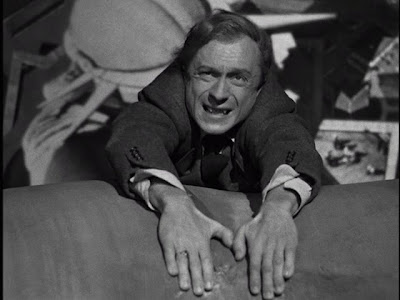
Wet Hot American Summer (2001) was the first quasi-official feature film project of the sketch comedy group The State. I've already discussed the transition into feature films by Derrick Comedy, another NYU-based group. Actually the 15 intervening years between The State and Derrick say something about the development of cutting edge comedy in the US. The State was a theater and video oriented group, transitioning easily to episodic television, especially with Monty Python as a model. Derrick Comedy is from the age of YouTube, in which the short film is the primary mode. The former tends toward absurdism, non sequitur and repeating characters. The latter tends toward parody and burlesque, but with a narrative basis. The contrast between the two groups is virtually a perfect statement of the essential differences between theater and film.
As an example, consider the difference in the way the groups approach the concept of a "character." In Mystery Team, the three leads play characters which are absurd and bizarre, but who are consistent, interact with other characters in plausible ways, feel emotions, grow and change. Characters on The State are primarily vehicle for comedic concepts, such as Louie the Guy Who Repeats His Catch Phrase. This is not meant to bear any relationship with a human being. It is not even a springboard for actual comedy. It is a comment on the very idea of comedy, specifically the threadbare device of running characters and their tired catch phrases. (I think Ricky Gervais nailed this topic in the second season of Extras, where the cardboard character and his hackneyed catchphrase became an albatross for Gervais.)
In point of fact, The State's best film work is the sketch comedy The Ten, riffing on the Ten Commandments. It almost seems like a Python premise. Of the ten sketches, three or four of them are gut-bustingly funny. But The Ten is not a real movie, any more than And Now For Something Completely Different is.
Wet Hot American Summer tries to have it both ways, or even three ways. It is primarily a parody of low-budget 1980s slob comedies (specifically camp comedies such as Meatballs), an object of nostalgia for people who graduated college in the late 80s and early 90s, like The State. So there are a number of gross-out jokes, some simple mistaken identity gags, sex frustration and crazy weird character gags, like the insane chef portrayed by Chris Meloni.
Sec0nd, like the films being parodied, WHAS would also like to establish characters with whom you sympathize and about whose ultimate fate you are supposed to care (I don't). Hence, there is a lukewarm romance between Janeane Garafolo and David Hyde Pierce, sex comedyu threads for Ken Marino and Michael Showalter, a weird romantic thread for Paul Rudd and Elizabeth Banks, and one for Amy Poehler and Bradley Cooper, which somehow culminates in a wedding between Bradley Cooper and Michael Ian Black, evidently the only stable and well-balanced romantic pairing in the movie.
Third, the film wants the freedom to make non sequitur sketch-type gags, regardless of what they do to the continuity or plausibility of the film. Hence the most famous sequence of the film, in which the counselors go to town for an hour to relax and get away, start mugging the citizens for drug money, wind up in a crack den and return happily to camp, none the worse for their hour of getting away from those pesky kids. Or Paul Rudd can make out while letting campers drown without apparent consequences. Or Janeane Garafolo can go ballistic when a camper is in trouble, begin screaming for a phone and proceed to trash the camp nurse's office, losing all sight of the object of the panic--finding a phone--and just knock everything to the floor and scream, ignoring the phone that is there. And in the final talent show sequence, one character can cause Skylab to land harmlessly in the middle of the camp with his mind--again, regardless of the facts about Skylab.
The fact is that the crazy stuff is the most fun and provokes the most outright laughter, but it also makes it impossible to accept WHAS as an actual movie. I trace this whole line of films back to Blazing Saddles, which was the first full-length burlesque I can remember, and which quickly abandoned all claims to plausibility, identification or narrative flow. The trap is that once you discard those elements of filmmaking, then your jokes must be awesome and constant. In Airplane, the flow of jokes is steady, but the quality tails off drastically. Blazing Saddles can't even find an ending, repeatedly deconstructing itself into boredom. Mel Brooks himself realized that this format was a dead end, and returned to sympathetic characters and a real story arc with the next film, Young Frankenstein (conceived by Gene Wilder).
Members of The State seems to have realized it and dialed it back in subsequent years, writing screenplays for the Night at the Museum series, a couple of the Herbie movies, Role Models, the tedious Reno 911 series and movie, Balls of Fury and the best feature work attributable to this group, Michael Ian Black's first-rate screenplay for Run, Fatboy, Run. But none of these aspire to the groundbreaking type of humor that The State once stood for.
So the question comes down to--how funny do you want to be? 'Cause for maximum laughs, you may have to blow up your own movie.





No comments:
Post a Comment